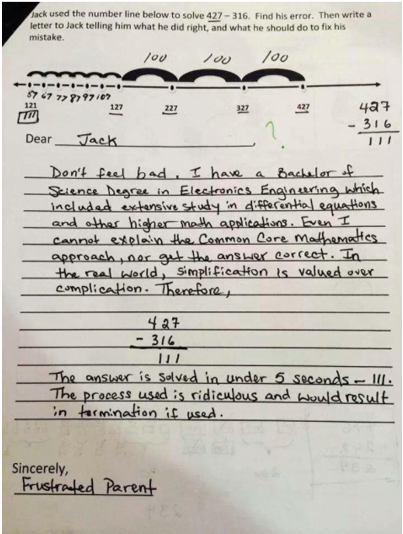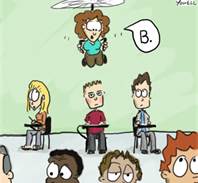 There is apparently a big story these days with what is called the Common Core. While I am an educator my focus is primarily on technology and I teach adults. Even with that said I’m a bit embarrassed to admit that I didn’t know much about the Common Core until I read this article.
There is apparently a big story these days with what is called the Common Core. While I am an educator my focus is primarily on technology and I teach adults. Even with that said I’m a bit embarrassed to admit that I didn’t know much about the Common Core until I read this article.
At this stage I haven’t done much research into the Common Core and I’m not writing this blog as a defense or an attack on it. I was just a bit amazed by the father’s reaction to the problem. I’m sure he’s had a lot more experience with the Common Core than have I and his reaction was likely an outburst related to accumulated feelings.
That being said, I’m a college dropout, not an EE, and it took me about ten seconds to see the method being taught for subtraction and it makes perfect sense. It’s exactly how I do math in my head when presented with a problem. The fact that someone with a degree in Electrical Engineering couldn’t figure this out is baffling to me. The father is also completely undermining the authority of the teacher and basically telling his child it’s fine to mock and ignore teachers. Good luck with that.
The original problem is a subtraction equation: 427 – 316. So, using base tens you subtract three one-hundreds, one ten, and six ones to arrive at 111. In the example the student failed to subtract the ten properly and went from 127 to 107.
The method being taught is very straightforward, and as I said, exactly the way I do subtraction in my head. The line at the top is an excellent representation of how I solve such a problem.
Please don’t take this as a defense of the Common Core as a whole because I don’t know enough about it to make such a statement. I’m just saying that the father’s reaction to this problem is nonsense, not the problem itself. Even then I’m willing to give him the benefit of the doubt. It’s likely this letter is the culmination of multiple frustrating events.
The process used is straight-forward and works perfectly. It takes about five seconds and can be done in the head instead of having to use a piece of paper to write down all the numbers. It’s, in my opinion, a better system for subtraction than the one the father presents.
What do you think?
Tom Liberman
Sword and Sorcery fantasy with a Libertarian Ideology
Current Release: The Spear of the Hunt
Coming Soon: The Broken Throne

 There was an
There was an